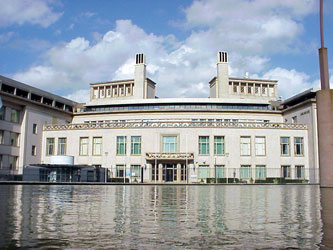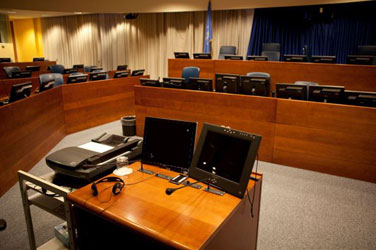Death on the Bench
[Excerpted from Chapter 12: Interregnum]
The year 2004 turned out to be intermission in the Milošević trial,
though an eventful one. The prosecution completed its case in February. The
presiding judge fell ill, resigned, and died in July. A replacement judge
was appointed. The Trial Chamber issued its decision that the prosecution
had produced enough evidence to support its case, including the charge of
genocide. The defense case was delayed again and again by Milošević's
illness, exhaustion, and manipulation, leading the Court to a “radical
review” of the trial and ultimately appointment of counsel. Milošević
angrily objected and refused to cooperate. His supporters organized a
boycott of defense witnesses, making it impossible for appointed counsel to
carry on. When the Court refused their application to withdraw, defense
counsel threatened to walk out. The witness boycott ended when a five judge
panel of the appeals chamber, led by President Theodor Meron from the US,
ruled in favor of Milošević. The year ended with two weeks of Milošević
leading his defense. In the process the court’s new-found assertion of
authority suffered a major setback.

In December 2003 Judge May looked pale. He slurred some words, forgot
others. By January he was forgetting to caution witnesses not to talk about
their testimony until it was concluded. As the prosecution case drew to an
end in February 2004, Judge May missed court for the first time in two
years. After the third day of his absence Milošević also stayed away, with a
recurrence of high blood pressure. The prosecution bowed to circumstances
and ended its case early.
Rumors abounded, fed by the tribunal’s secrecy.1 The tribunal’s president
did not want the public to know the seriousness of Judge May’s condition.
Leaks were inevitable. It was not long before the New York Times reported
that Judge May had a brain tumor. Tribunal halls and public airwaves
crackled with speculation over its effect on the trial. Could a new judge
familiarize himself or herself with thousands of pages of documents and 300
videotaped trial days so that the trial could continue? Could a mistrial be
declared under ICTY rules? After two years, would the trial begin again from
the beginning, or would it end and Milošević be set free?
ICTY rules provide that the president may appoint a replacement judge if
a sitting judge is unable to continue2. The accused must consent, but the
remaining judges may override non-consent if they decide that it is in the
interests of justice for the case to proceed3. Milošević refused to say
whether he agreed to a replacement judge. It was an administrative matter of
an illegal tribunal, he declared, and he had nothing to say about it.
President Meron interpreted his nonresponse as refusal to accept appointment
of a new judge, returning the matter to Judges Robinson and Kwon, who
decided in the interests of justice to let the case proceed. President Meron
appointed an accomplished prosecutor and criminal trial judge, Lord Iain
Bonomy from Scotland, to replace Judge May. The panel elected Judge Robinson
as its new presiding judge.
Observers wondered how Robinson would approach his new role.
Since Judge
May as chief judge had primary responsibility to rein in Milošević, Robinson
had taken a conciliatory position with the accused, advising him in a
friendly way and often favoring his position in evidentiary and procedural
matters. Milošević courted Judge Robinson, attempting to play on the
third-world status of his country, Jamaica, in relation to the first-world
powers that had attacked Serbia in 1999. When Robinson assumed the center
chair, however, he also assumed responsibility to manage the trial. He made
his position clear during the pre-defense conference, when he strictly
limited Milošević's case to 150 days, the same allowed the prosecution,
though the accused insisted that he needed to call 1,631 witnesses. Despite
his newfound assertion, Robinson was not a strong presiding judge. Often, it
was the new Scottish judge who challenged Milošević's argumentation,
irrelevancies, and time-wasting.
According to backroom gossip, Judge Bonomy was known at home as “the
hanging judge” for his severity in criminal cases. He was also known as a
judge who managed his courtroom with a heavy hand. Bonomy’s experience as a
criminal trial judge and former prosecutor was an invaluable addition to a
court suffering from the loss of Judge May’s practical expertise. Nor did he
show reluctance to hold the accused accountable as May too often had done,
though he lacked the power of the presiding judge to cut short repetitive
and irrelevant questioning. Judge Bonomy showed that he was also up to the
task of assimilating two years of testimony, documentation, and legal
rulings.
Milošević's defense was due to start in early June, after a three-month
hiatus, but the Court was forced to extend the adjournment when Milošević
fell ill. By July he was still unable to return to court. The doctor advised
that his blood pressure was too high to begin the stressful work of
presenting his defense.
As the summer recess approached, with Milošević no more ready for trial
because of his poor health, the court finally took matters in hand. “The
Chamber clearly is of the view that the time has come for a radical review
of the trial process and continuation of the trial in light of the health
problems of the Accused,” Judge Robinson declared.
Steven Kay advised the court that it should take up both the accused’s
ability to return to trial in the immediate future and his long-term fitness
to stand trial at all. The prosecutor pressed the judges to impose counsel.
“It is now essential if the case is to be properly concluded in a reasonable
time that counsel be imposed.” Nice argued that Milošević should be allowed
to appoint someone of his choosing; if he declined, the court should step
in. Nice suggested a video link to Milošević's cell, allowing him to view
proceedings on days he was not able to attend. To all this Milošević
vehemently objected.
“It is out of the question, as you know,” he thundered. “Nor will I ever
agree to it. . . . I am going to examine my witnesses and will be present
here in this room.” Unaware that he was undermining his position, he told
the court of his doctor’s advice to work a maximum of three days per week,
including time out of court. That would considerably reduce the number of
trial days -- perhaps to one a week -- pushing the trial’s end out of sight.

The Trial Chamber ordered an examination of Milošević by an independent
cardiologist to determine his fitness to represent himself and “the likely
impact on the trial schedule should he continue to do so.” Referring to the
latest medical report advising that Milošević's health problem could be
expected to recur and considering the time lost because of his illness
(sixty-six days during the prosecution’s case in addition to the abbreviated
trial schedule), the court noted “there is evidence that the health of the
Accused is such that he may not be fit to continue to represent himself, and
that his continuing to represent himself could adversely affect the fair and
expeditious conduct of the trial.” It was the clearest statement yet that
the trial chamber was moving towards appointing counsel. The court rejected,
for lack of evidence, Kay’s suggestion that the accused might not be fit to
stand trial at all.
The court found reinforcement for its position in Judge Wolfgang
Schomburg’s handling of Vojislav Seselj, the notorious Serb nationalist who
insisted on representing himself amid tirades in court. With evidence of
Seselj’s obstructive behavior, Judge Schomburg and his two co-judges
directed the registrar to appoint standby counsel who would attend all court
sessions and be available to take over should the defendant disrupt
proceedings4.
The Milošević court noted that civil law countries like Serbia
and Montenegro do not allow an accused to represent himself in serious
cases, providing further justification for imposing counsel5.
The prospect of appointing counsel over the objections of an accused who
insisted on representing himself set off a firestorm among lawyers and
observers. On one side were those who argued that the right to
self-representation is fundamental, like the rights to practice one’s
religion and speak freely on political issues. Any infringement, in this
view, makes the trial unfair. On the other side were those who held that
self-representation was a qualified right; the fundamental right was to a
fair trial. From this perspective self-representation amounting to an
obstruction of justice waived the right, since it made a fair trial
impossible.
The argument over the right to self-representation obscured the real
issue, the tribunal’s legitimacy. To what extent, if any, may an accused
utilize a trial for his own political purposes? From the beginning Milošević
made clear that he had no intention of defending himself before a body he
considered illegal, but he would use whatever opportunity presented itself
to make his political case to the public. He had appealed and lost his
challenge to the tribunal’s legitimacy, established in the Tadic case long
before he arrived6.
It all came down to Milošević's insistence that he would have his forum
on his own terms, or he would not participate. It was not the right to
defend himself that he championed. While the tribunal could not force him to
participate, it could refuse to be his instrument for advancing a political
agenda and undermining their authority. As Judge Schomburg stated in
appointing standby counsel over Seselj’s objections, an accused’s right to
self-representation may be limited if the interests of justice so require.
The interests of justice include the right to a fair trial, the judge
declared, “which is not only a fundamental right of the accused, but also a
fundamental interest of the Tribunal related to its own legitimacy.” With
the focus on the accused and his rights at trial, other interests were
ignored, not least of which were those of the public and the victims of
Milošević's crimes in seeing justice done.
_______________________________
FIVE.
Interregnum
1
In part the tribunal’s secrecy derived from the need to protect confidential sources and witnesses
and the general confidentiality required of lawyers, but it grew over time beyond what was necessary.
2 ICTY Rule 15 bis (C).
3ICTY Rule 15 bis (D).
4Prosecutor v. Seselj, Case No.
IT-03-67-PT, “Decision on Prosecution’s Motion for Order Appointing Counsel
to Assist Vojislav Seselj with his Defence,” 9 May 2003.
5“The Code of
Criminal Procedure of the Federal Republic of Yugoslavia (2001), which
remains valid in Serbia, provides that imposition of defence counsel is
mandatory in proceedings relating to offences which carry in excess of ten
years imprisonment.” Article 71(1). “The rationale behind the mandatory
assignment of counsel in these jurisdictions appears to be that, in case
where the personal liberty of an accused is at stake, the right to a fair
trial, which includes the right to an adequate and effective defence,
actually imposes a duty on the State to ensure that the accused is
represented by professional counsel whose task is to ensure that the
interests of the accused are fully protected throughout the proceedings.”
“Trial Chamber’s Reasons for Decision on Assignment of Defence Counsel,” 22
September 2004, 20.
6Prosecutor v. Tadic, “Appeals Chamber Decision on
the Defence Motion for Interlocutory Appeal on Jurisdiction,” 2 October
1995. The chamber found the ability of a judicial tribunal “to determine
its own jurisdiction” is “a major part, of [its] incidental or inherent
jurisdiction.” The UN Security Council had authority under Article 41 of
the UN Charter to establish the ICTY. The Court decided a threat to the
peace in the former Yugoslavia justified invocation of Chapter VII of the
Charter to establish an international criminal court.
© Duke University Press, 2010
All rights reserved
Read More
Excerpts from the Book
Go Back to Twilight of Impunity Main Page